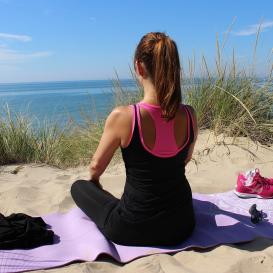Close your eyes. Take a deep breath, in and out. How do you feel?
Mindfulness is the act of checking in with yourself and taking a bit of time out of your busy day to focus on you and your wellbeing. It’s a meditation practice that focuses on the now and staying in the present moment.
We’re bombarded every day with the latest health and fitness trends, and many people follow strict diets and exercise regimes – but how many of us stop and think about our mental health?
It’s time to throw away any preconceptions surrounding mindfulness and meditation, and recognise what you can gain from having a better awareness of your own mind. Anyone can benefit from just a few moments a day with themselves.
What are the benefits of mindfulness?
Mindfulness has been found to help with mental and emotional wellbeing, and also physical factors like chronic pain. Alongside the health benefits, you can also gain a greater understanding of things like empathy and compassion for others.
The NHS now recognises mindfulness as part of the treatment plan for stress, anxiety, depression and more. With more medical professionals having an understanding of the benefits of mindfulness, and patients more likely to be guided in that direction, we’re moving towards mindfulness becoming a more mainstream medical term.

How to get started with Mindfulness
I first discovered mindfulness with Mindfulness for Health by Vidyamala Burch and Danny Penman. Recommended by my physiotherapist, this book offered background reading into mindfulness and an eight week course with tailored readings, audio guides, tips and meditation practices. This was a great step into mindfulness with structure and guidance, and since then I’ve tried other audio guides and apps to continue practicing mindfulness every day.
“Thousands of peer-reviewed scientific papers prove that mindfulness reduces pain, enhances mental and physical wellbeing and helps people deal with the stresses and strains of daily life.” -Mindfulness for Health
I never thought mindfulness meditation would be for me, and I think a lot of people have similar apprehensions, but eventually I had reached a breaking point where I was willing to try anything. Now I look back and realise that it was one of the most beneficial things I’ve tried and I wish someone had recommended it sooner.
For me, practicing mindfulness helped me to break some of the patterns of anxiety. It gave me daily structure and something else to focus on. It’s something I can turn to when I’m feeling stressed out or when the pain of chronic illness gets unbearable. It’s something that is just for me, that I have control over, and that nobody else can take away. It’s a chance to relax and unwind before I go to sleep, and to wake up and start the day with a positive mind-set.
Even if you don’t think that mindfulness is for you, all I would say is to just give it a try. Whether it’s something you explore on your own, or with the support of a healthcare professional, there’s no harm in trying something that could end up improving your quality of life.
Top 3 Mindfulness apps
If you’re looking for the best place to start there’s probably nothing easier than a free app on your phone. Carry that mindfulness reminder with you and enjoy the benefits of meditation wherever you are. These apps (along with many others) have been tried and tested by yours truly over the last year, and are free on both IOS and Android.
1) Headspace
Headspace is one of my favourites as it is really accessible with simple and fun animations to explain different aspects of mindfulness. I can highly recommend the “Take 10 Challenge” which is available in the free version. Tracking your progress with a 10 minute practice every day for 10 days is a great way to introduce yourself into mindfulness. Unfortunately, after you’ve taken the challenge there’s a monthly subscription to access more content, but it’s still a great place to start.
2) Calm
The Calm app could be for you if you’d like to immerse yourself in a relaxing scene as part of your practice. On opening the app you can choose your favourite scene, including waves washing over the beach at sunset and falling rain in the forest. The 7 Days to Calm is a great introduction, but beyond that the free content is limited. I wouldn’t recommend splashing out for a mindfulness beginner, but if meditation becomes a big part of your life then it could be a worthy investment.
— Calm (@calm) June 11, 2015
3) Stop, breathe and think.
This is one of the best free apps and offers a wide range of content, with additional content available for a one-off charge, which for many is much more appealing than a monthly subscription. What makes this app different is how you check-in your mental and physical wellbeing, to receive recommended mindfulness meditations based on your current mood. This is a great approach as it not only increases your self-awareness but does the hard work for you in deciding which meditations to try.

Final words
When you start out, you might feel a little silly, or that you can’t see the point. But stick with it and allow the sense of relaxation and focus to wash over you. Mindfulness meditations come in many shapes and forms, and while it might take some time to find the one that’s right for you, for me it has been completely worth it.
If you give mindfulness a try we’d love to know what you think. Share your experiences in the comments below!









